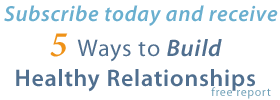Relationship Problems: Yours, Mine, Ours? Part III
Greetings. Welcome to my post. My hope and desire is that you will find these posts to be informative and helpful for you. Life is a journey filled with mountains and valleys in our relational life and in our personal life. Sometimes we can predict and make something happen. But sometimes we can never predict an event or relationship difficulty and we need to adjust and cope with these curve balls. At times life can be great but as you know, life can also be difficult and challenging.
So when we think about relationships and relationship problems, how do you approach problems? As a codependent, one of the emotions you may recognizer is anger. As we all know, anger can be your friend or anger can be your enemy. Using anger as your friend can be a powerful force to stand up to something that you feel needs to be protected. For example, if you do not want to be robbed, you will use your anger to stand up to wrong people who may be tempted to steal and using your anger as a friend to protect your home and keep the bad out. Another example of anger being your friend is the wonderful work of the advocacy group called MADD or Mothers against Drunk Drivers. Anger is used in a healthy way to stop people who drink and drive by using their car as a weapon to hurt others.
But if you were like me, in your growing up years in your family, anger was not used as a friend but used as an enemy. My father was a kind, giving man but when he got angry, he used this emotion to go into a rage and into a tirade being critical or demeaning of me and my brothers. Maybe you can relate to me in having a parent, who on a weekly basis, expressed their mean anger on members of the family and this anger or angry person became an unacceptable and unwelcomed guest in the family. When someone was angry, avoiding that person or preventing that person from becoming angry became a strategy you used.
So let me ask you a question: Do you avoid anger at all costs? As a codependent pleaser, do you tell yourself not to get angry and avoid or quietly say to yourself I cannot get angry? Or in your relationships, do you come up with different strategies to make sure the person you are relating also does not get angry? Because there was so much chaos, rage and hurt in your growing up years, are you finding now you want to avoid anger at all costs in your current relationships?
So now our approach to anger and angry people as an adult is to learn how to appease and to rescue. We engage in these practices so we can please, appease, comply or approve as a strategy to avoid anger. These strategies or approaches lead to an attempt to try to fix the other person or to make sure her or she does not get angry. So many times people will walk on eggshells, avoid certain subjects, and try to not make a mistake so that the person they have a relationship with, will not be angry with them or in general get angry. If you find you are living according to these standards, then you know of all the various ways you may use to make sure someone is not angry with you.
Avoiding only leads to you not thinking about yourself but only becoming obsessed with the other person by studying them, figure them out, and coming up with ways to know that person so as to make sure they are happy, and not angry. So then you think of ways to make sure you keep them happy so they will not get mad. You become an expert at studying and knowing this person to learn how to keep them happy. Thus this codependent behavior continues in which your happiness becomes dependent upon how they feel and not how you feel. Focusing on them and their happiness is the codependent role to make sure anger is avoided and only happiness is accepted.











